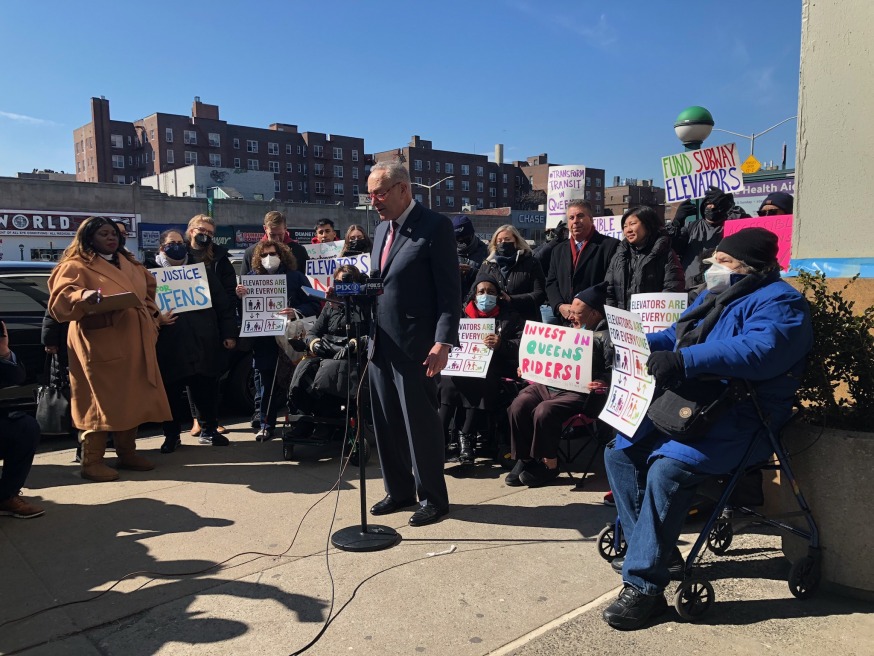
U.S. Sen. Charles Schumer in Rego Park Friday calling for the state to accelerate the installation of new elevators at MTA stations (Photo: Courtesy of the Riders Alliance)
March 7, 2022 By Christian Murray
Elected officials, subway riders and disability rights activists gathered at a subway station in Rego Park Friday to call on New York State to allocate federal infrastructure funds toward the construction of elevators at MTA and LIRR stations.
U.S. Sen. Charles Schumer, Rep. Grace Meng, and disability rights activists came together at the Rego Park 63rd Drive station to call on state officials to use federal funds that were included as part of the Infrastructure and Jobs Act of 2021 to construct elevators and other accessibility upgrades.
The officials were joined by representatives from leading civic advocacy organizations including, Riders Alliance, Straphangers Campaign, UPSTAND and Queens Community Board 6, who also called on the state to use the federal infrastructure funds to increase the frequency of subway and bus service. The Infrastructure and Jobs Act will send an estimated $11 billion to the MTA.
“As money from the federal infrastructure bill continues to flow to New York, it is critical for the city and state to make sure that funding is directed towards installing elevators at the Queens subway and LIRR stations that need them,” said Congresswoman Meng. “All of my constituents deserve easy access to our subway and LIRR stops. They should not be out of reach to anybody. It is time to finally ensure equal access to our mass transit system.”
Schumer, meanwhile, said that the transit system was failing to meet the needs of many residents since it doesn’t have the number of elevators needed to make it accessible. He noted that the press conference was being held at the Rego Park station since it lacks such access.
Meanwhile, state Assembly Member Andrew Hevesi, who represents Forest Hills, said that it is now the state’s responsibility to make sure that the stations are accessible.
“Our federal reps delivered billions of dollars in infrastructure funds for the MTA,” Hevesi said. “It’s now on NYS to responsibly administer these funds for a more accessible, equitable MTA system. First priority is bringing every station up to ADA compliance in accordance w/ federal law.”
Transit advocates noted that it is very difficult for residents to travel via subway when most do not have elevators. Presently, about 25 percent of the 472 stations in the subway system comply with the Americans with Disabilities Act.
Meanwhile, advocates also called for federal funds to be spent on bus and subway service upgrades, such as ensuring that buses and subways run every six minutes, seven days a week. They argued it would bring back riders, improve MTA revenue, advance equity and fight climate change.
“Federal infrastructure funding is a unique opportunity for Governor Hochul to invest in transit riders’ top priorities, said Riders Alliance senior organizer Danna Dennis. “The governor should double down on the expansion of subway accessibility and ensure that riders have access to affordable and frequent public transportation service as we recover from the pandemic.”
3 Comments






How about putting in tall turnstiles at 67th Avenue station (on the 67th Avenue side and locking the emergency door outside the station on the 67th Drive side so that people can’t open it and get inside the station
Subway elevators at 67th Ave.for R & M trains would help people going and coming from local hospital and Mt. Sinai medical complex offices above station at Queens Blvd.
Here are two ways to obtain financial support to pay for accelerating the number of subway stations to reach compliance with the Americans With Disabilities Act (ADA). The MTA receives $1.5 billion in annual assistance from various Federal Transit Administration formula funding grant programs. The MTA $51 billion 2020 – 2024 Five Year Capital Plan has programmed significant funding to dramatically increase the number of additional subway stations reaching full ADA compliance. The MTA can amend this plan to add the number of ADA accessible stations with increases in available federal funding. This should be a higher priority for the expenditure of federal dollars than system expansion projects such as $2.6 billion Metro North Bronx Penn Station access, $6.9 billion Second Avenue Subway Phase 2 or the multi billion dollar new Brooklyn/Queens subway. Why not ask any major business, college, hospital or high rise residential development who benefit from subway stations adjacent to their facility to sponsor installation of elevator(s). Let them split the cost 50% with the MTA NYC Transit in exchange for naming rights to the elevator(s). .
(Larry Penner is a transportation historian, advocate and writer who previously worked for the Federal Transit Administration Region 2 NY Office. This included the development, review, approval and oversight for grants supporting billions in capital projects and programs on behalf of the MTA, NYC Transit, MTA Bus, Long Island Rail Road, Metro North Rail Road and NYC Department of Transportation along with 30 other NY & NJ transit agencies).